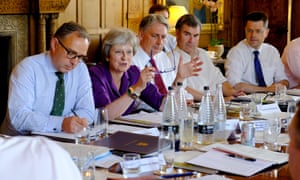Theresa May’s desperate attempts to unite her party and country behind a new Brexit blueprint are under severe strain, as more than 100 entrepreneurs and founders of UK businesses dismissed it as unworkable – and hardline anti-EU Conservative MPs warned it could mean an outcome worse than “no deal” at all.
There were also signs that Brussels was less than impressed after an initial examination of the plans, which were thrashed out and agreed by the entire cabinet at an all-day summit at Chequers on Friday.
The proposals would involve a new “facilitated customs arrangement” intended to remove the need for a hard border in Ireland, and the creation of a UK-EU free trade area, in which the UK would abide by a “common rule book” of EU regulations. As the prime minister and her officials renewed appeals for ministerial loyalty and an end to infighting from the likes of the foreign secretary, Boris Johnson, it was her own hardline pro-Brexit backbenchers who broke cover to resume hostilities, while business leaders said the plans would mean extra bureaucracy and cost, as they demanded full membership of the customs union.
A letter released on Saturday night by the co-founder of Innocent Drinks, Richard Reed, and signed by the founders of Pret, Waterstones, Zoopla, Net-a- Porter, Domino’s, YO! Sushi and Jack Wills, among others, said that May’s customs proposal would be costly and bureaucratic for UK firms. They called for MPs to back amendments to the government’s trade and customs bills that would secure full customs union membership when the legislation is considered in parliament.
From the other side of the Brexit argument, the Tory MP and leader of the European Research Group (ERG) of hardline Brexiters, Jacob Rees-Mogg, questioned whether signing up to elements of the EU rulebook would amount to Brexit at all.
He warned that abiding by a common rule book could make “trade deals almost impossible”, adding that “it is possible that this deal is worse” than a “no-deal” Brexit.
The Tory MP Andrea Jenkyns said the danger was that British business would “continue to be a rule-taker from the EU”. Jenkyns indicated she would back a leadership challenge against May if she concluded that the plans agreed by the prime minister amounted to a watering down of Brexit.
Speaking to the BBC, May said that the plan was aimed at making sure “we deliver on Brexit for the people, because I won’t let people down”. She insisted that the UK would regain control of its borders, but refused to rule out giving EU citizens preferential treatment under the future immigration policy.
Writing in the Observer, David Lidington, minister for the cabinet office, says: “Free movement will come to an end, restoring control of our borders. The supremacy of British courts will be restored, by ending the jurisdiction of the ECJ [European court of justice] in the UK – giving us back control of our laws. And there will be no more sending vast sums of money each year to the EU, giving us back control of our money.”
However, although many Eurosceptic MPs on the ERG are waiting to see what the prime minister says to the House of Commons on Monday, a damning briefing circulated among ERG members on Saturday night warns that the plan amounts to a “worst-of-all-worlds Black Hole Brexit where the UK is stuck permanently as a vassal state in the EU’s legal and regulatory tarpit”.
After making her statement to the Commons, May will address the 1922 Committee of Tory MPs in the evening, in an attempt to bind her MPs behind the proposals thrashed out and agreed during Friday’s meeting. Tory MPs are being offered one-to-one briefings in Downing Street over the next few days to win them round before publication of a white paper, which will spell out the plans in more detail, on Thursday.
In Brussels, which is giving little formal reaction before it has studied the white paper, sources warned that May’s customs compromise looked very similar to the “new customs partnership” that the EU rejected as “magical thinking” 11 months ago.
One senior diplomat said that the Chequers meeting had resulted in a “melange of earlier proposals that were not really feasible”. Stressing that his government needed to see the white paper before taking a position, he said: “A goulash gets better the more it is recooked. I am not sure about whether the customs proposals share the same quality.”
Tory Remainers broadly welcomed progress towards a softer Brexit. Writing in Observer, Nicky Morgan, who chairs the all-party Treasury select committee, says the proposed free-trade area “sounds remarkably like the common market”. In a dig at Johnson, who reportedly commented “fuck business” when reacting to claims that some firms would take jobs abroad, and to the health secretary, Jeremy Hunt, who said it was irresponsible for business to give such warnings, Morgan writes: “The cabinet have very deliberately chosen to listen to business and not swear at them or ask them to keep quiet. That is good for our future prosperity.”
Asked if a second referendum was now more likely, the Labour leader, Jeremy Corbyn, said: “I think it means that the issue is going to have to come back to parliament. There’s going to have to be a proper vote on it.”
